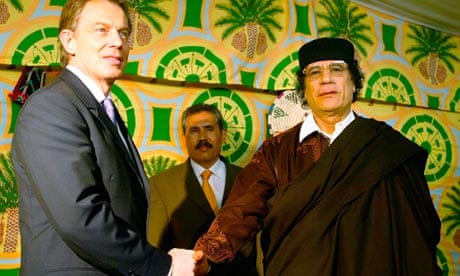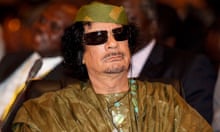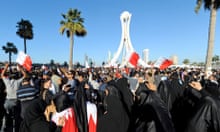On 25 February 2004, Tony Blair stood up in the Libyan capital Tripoli and shook hands with an eccentric dictator who until then had been regarded as an international pariah for his involvement in sponsoring terrorism.
That man was Muammar Gaddafi, who, Blair announced, had joined Britain in the fight against terror.
Asked if he was queasy about meeting Libya's leader, Blair replied: "It was strange, given the history, to come here and do this and, of course, I am conscious of the pain that people have suffered as a result of terrorist actions in the past."
What Blair meant, to be explicit, was Libya's involvement in downing a US airliner over the Scottish town of Lockerbie, and the shooting of a British police constable, WPC Yvonne Fletcher, by a gunman who fired from inside the Libyan embassy in London.
Announcing a "new relationship", however, Blair said he had been struck by how the Libyan leader wished to join with Britain in "common cause with us against al-Qaida, extremists and terrorism".
That was then. In the last few days it has been Gaddafi who has looked liked the extremist, sending troops, and reportedly mercenaries, to crush demonstrations against his rule in the towns of Benghazi and Al Bayda. Human Rights Watch says this has led to the deaths of at least 85 of his people.
But it has not only been a dubious partnership against terror that has increasingly embroiled the United Kingdom in Libya's affairs. There has been a second "common cause" that has underpinned the relationship with Gaddafi's regime, underscored by the announcement on the same day in 2004 of a £550m deal with Shell for exploration rights.
Now Britain's risky and controversial relationship with Libya is beginning rapidly to unravel.
BP, which is also heavily involved in the country, is weeks away from beginning a major drilling operation in a vast area around the desert town of Ghadames. Indeed, a group of US senators last year suggested that the decision to free the Lockerbie bomber Abdelbaset al-Megrahi could have been influenced by lobbying over BP's commercial interests in Libya — an allegation fiercely denied by the Scottish government.
And it is not only Britain's foreign policy on Libya that has sent diplomats scurrying into disarray as they have tried to keep up with the wave of popular uprisings against regimes that Britain supported, but the policy for the entire region.
According to Claire Spencer, head of the Middle East and North Africa programme at Chatham House, the rapprochement with Libya in 2004 was founded on assumptions that dominated for a decade post-9/11, obsessed as the west was with the fight against al-Qaida, the wider "global war on terror" and fear of mass migration and the rising influence of Iran.
"Against that we backed the other half, the so-called moderates standing up for our values – regimes in places like Saudi Arabia, Egypt and Israel." The domination of that foreign policy agenda, she believes, meant that not only in the Foreign Office but in the Quai d'Orsay and the US State Department, those warning of the growing potential for unrest across the region were ignored.
Though Libya had faced accusations of refusing to recognise the rights of refugees, indefinite detentions, torture and arbitrary expulsions, Spencer believes that British diplomats felt they had only the most limited leverage on their new partner.
By yesterday the queasiness had turned to outright horror, as Britain's foreign secretary William Hague, a day after his department revoked all British arms licences to Libya and Bahrain, condemned the "unacceptable and horrifying'' use of violence by Gaddafi's security forces against his own people, "including reports of the use of heavy weapons fire and a unit of snipers against demonstrators".
Which leaves the crucial question of whether Gaddafi can survive. In the past, as Spencer points out, the self-styled Supreme Guide has been adept at ditching prime ministers and others to protect his position and place himself on the side of the people, a tactic he tried to use even in the current protests. Now he has abandoned that in favour of the use of outright violent suppression.
If he believes that he can confine the problems to the country's east, he may be mistaken. Many from that region have families in Tripoli. He may find it impossible to stop rebellion spreading.
And Britain's manoeuvring to distance itself from the man it has supported for the last seven years may have come too late.



